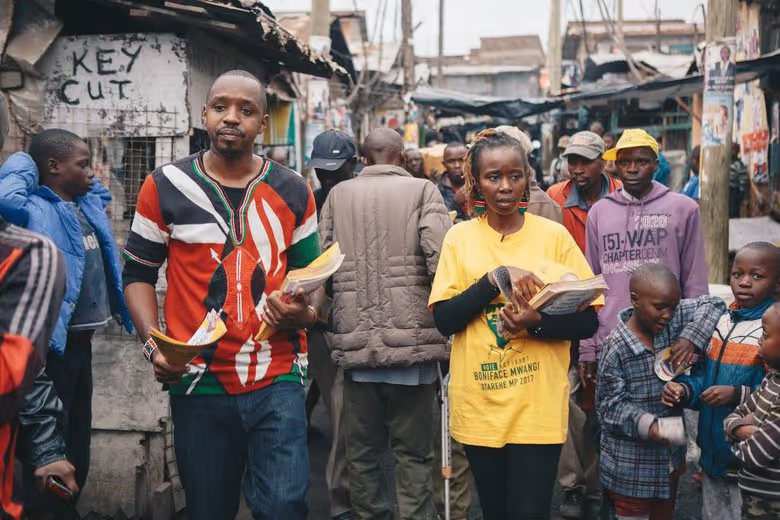Softie Discussion Guide Background Information
Background Information

Getting to know Boniface “Softie” Mwangi
Boniface “Softie” Mwangi was born in 1983 in Taveta, Kenya, which is on the border of Tanzania in the region of East Africa. As mentioned in the film, Softie was one of seven children born and raised by a single mother who sold books in the local market. His grandparents also helped raise him. Softie’s mother died when he was 17 years old. The name Softie was given to Mwangi because his family members thought he was weak and small and “soft,” but didn’t yet know the strength Mwangi had in him for politics and community activism. Softie did not consistently commit to school, but after his mother passed, he decided he wanted to do better for his life, so he took up photojournalism. Quickly, Softie became captivated by capturing the violence and corruption in and through Kenya, most notably documenting the post-election violence in 2007. This post-election phase is also what propelled his career in politics. Softie formed the Ukweli Party when he decided to run for a Member of Parliament (MP) with the Starehe Constituency. The Ukweli Party believed in shifting the mindset of the Kenyan people to show that all lives matter equally, expose the corruption of Kenyan politics and demonstrate that there could be something better for the country. Softie and the Ukweli party ran a clean campaign that focused on getting to know the community, discussing interests and concerns that impacted their daily lives. Khadija Mohammed, Softie’s Campaign Manager, said Softie and the Ukweli Party revolutionized how people campaign and raised funds from individual donors and the radical activist community—it was the first time a candidate ran on principle alone. Despite the major strides and sacrifices Softie made in his election for MP for the Starehe Constituency, he did not win over enough votes.
Tribalism and the Violence of Colonialism
Tribalism is a state of people being organized by a tribe. In the film, Softie describes how peoples’ identity in Kenya is defined by tribal affiliation and that people are positioned socially and politically according to tribe. He says, “And so the identity in Kenyan politics is not nationalism, patriotism, core values, a bigger vision for a better Kenya. The identity in this country is tribe. Your last name defines you.” The country is divided by ethnic groups and tribes within these ethnic groups. Kenya is home to more than 40 tribes, each with their own languages and cultures. As Softie discusses in the film, the separation between tribes and ethnic groups stem from a legacy of colonization—the British determined which tribes would be more or less “valuable,” forced assimilation to white Western cultural practices, and attached stereotypes to different tribes. The lasting legacy of British oppression and colonization is seen in social, economic, and political stratification in Kenya today. As a strategy of colonial domination, the British emphasized tribalism as a tool for sustaining power over Kenyan people by keeping them divided against one another. In the film, Softie makes it clear how tribalism was a consequence imposed on Kenya by the British during colonization. By dividing Kenyan people among tribes (a common strategy used by colonizers of African countries) it created a caste system that the people then internalize as value systems by which they measure the “worth” of fellow Kenyans. The violence of colonization is illuminated as we see how a history of colonizers’ manipulation of tribalism introduced value-systems based on which tribes most aligned with whiteness. People, Kenyans included, internalized these scripts, narratives, and beliefs about themselves and their people. Tribalism became a tool for division between the people - turning countrymen against countrymen, rather than focusing on the colonizers’ exploitation and oppression of a united Kenyan people.
In 1920, Kenya officially became a British Colony. The African population of Kenya was banned from political participation until the 1940s. In 1924 members of the Kikuyu, Embu, Meru, and Kamba took an oath to fight for freedom and joined together to resist British rule. Inspired by the forcible removal of Kenyans from their home territories to resource-poor areas at the hands of white settlers, the uprising was called the Mau Mau rebellion. The rebellion lasted from 1952 to 1959, and during this time, Kenya was placed under a state of emergency as many Kenyans were incarcerated or sentenced to detention camps. Up to 90,000 Kenyan people were killed. During this, many Kenyans became increasingly political and committed to change. Jomo Kenyatta was sentenced to seven years imprisonment and charged with leading the Mau Mau rebellion. Kenya gained independence in 1963 and the following year Jomo Kenyatta, former political prisoner, became Kenya’s first President.
In 2007, after Kenya’s presidential election, Mwai Kibaki was declared the winner despite evidence of voter fraud, which inspired political revolt. The opposition took to the streets and declared Raila Odinga the “people’s president” but were met with violence that left over 1,500 people dead. Under Kibaki, the government banned live media broadcasts and the violence continued for two months with excessive police brutality against protestors, corruption and oppression leading some Kenyans to grow even more distrustful of their leaders. Kenya’s political history shows how colonial strategies of creating boundaries in order to make tribal oppositions a site for conflict is deeply seeded in the country and that even in contemporary politics, the oppositions and inequalities remain a site of struggle. It is this site of struggle that Softie commits to for the sake of his people and his family.
The politics of community activism, love and sacrifice
“The revolution comes first. Then love follows.” — Boniface “Softie” Mwangi
Softie offers an intimate glimpse into the difficult position community organizers and activists must navigate in the process of fighting for justice and requires us to consider the dynamic relationship between familial love and love of country. When Njeri and Softie are in the car, she says to him, “You have given your country your life.” He replies by saying that if placing God, Family, and Country in order of importance, country comes first “because when you fight for your country, your kids benefit.” Dedicated activists and community organizers have historically made sacrifices in their struggle for more just societies, giving not only their time, money, energy but also sacrificing their health, safety, and the livelihood of their families. We come to understand that the decision is impossible to negotiate—if the revolution is not centered, then activists’ families and communities will continue to suffer because suffering and threat are outside forces imposed upon activists, their families, and their communities. Softie asks us to interrogate the conditions that force activists into a space of negotiating priorities in their lives.
Often, the intimate sacrifices are invisible when revolutionary political figureheads are in the midst of struggle. Softie offers a more critical examination of these conditions and draws direct connections between the role of support and solidarity provided by family and community and the responsibility of frontline activists. In this sense, it is the family behind-the-scenes who are the unsung heroes of movements. The personal is deeply political and the intersection of personal-political can also be an inspirational training-ground for future generations of young activists. Take, for example, when Softie’s children ask where he is going and he responds, “I am going to topple the government.” This moment can be viewed as both an expression of love and political education: Softie is setting an example for his children that being an active citizen is one way to express love for one’s country and also love for his family. The personal and political cannot be untangled because the futures and safety of people we are responsible to are always already bound up in political futures that disproportionately set the parameters for safety and security along political and historical lines. The politics of community, family, and sacrifice become an issue of (mis)alignment and his family is threatened and forced to seek asylum in the U.S. We see every individual playing a crucial role in the ecosystem of resistance movements. Activism takes shape in multiple ways in this film, offering examples of how grassroots movements require people power composed of those on the frontlines and those who are behind the scenes, making life-changing sacrifices and decisions themselves.

